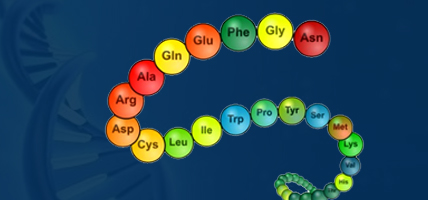


A peptide is a short chain of amino acids, containing 2 or more amino acids. In a body, peptides are found in every cell and perform a wide range of cellular functions. Biologically active peptides may act as growth factors, hormones, neurotransmitters, blocking pathways, antigens, toxins and antibiotics. The complex long chains polypeptide versions of peptides are known as proteins which provide structural support and act as enzymes, carriers, or hormones. Peptides & proteins are studied within the field of proteomics.
In life sciences research a lot of different types of peptides are proteins required for various studies needs. Commercially available peptides are ready to use and highly purified, available from diverse sources. The offered peptides save researchers time and provide the reliability of function and activity. Peptides are available as natural peptides and synthetic peptides.
Natural Peptides:
Natural peptides of varying complexity occur abundantly in any living system. Peptides are formed in living cells which acts as a factory. By the natural process of transcription, a gene sequence on DNA is converted into a peptide. The peptides are formed in the endoplasmic reticulum of the cells, then passed to Golgi apparatus and packed in secretory vesicles to send out of the cell. Separation and purification of natural peptides is a cumbersome process as the other components of the cells may participate as impurities. The purity of commercial peptides is well-taken care by the supplier company who delivers assured biological activity of the peptide and no interference by impurities. The natural peptides may b produced by recombinant DNA technology to obtain the commercial peptides in bulk quantities and to reduce the cost of production. Looking into purification cost of synthetic peptides, the chemical peptide synthesis could be an economical alternative.
Synthetic Peptides:
Synthetic peptides are produced artificially by using chemical synthesizers. The synthesis is achieved by coupling the carboxyl group or C-terminus of one amino acid to the amino group or N-terminus of another. Solid-phase peptide synthesis method provides the most reliable and most precise peptide synthesis method to deliver small to medium size peptides. Chemical synthesis has advantages of controlling the production limits and restricting the impurities which remains concern during natural peptide production. The synthesis process can be applied to produce peptides difficult to express in bacteria system, peptides involving incorporation of unnatural amino acids and modification of peptide backbone. The process can also be applied to obtain D-proteins, made of D-amino acids.
We offer thousands of natural and synthesise peptides available in ready stock with our suppliers. To meet the need of specific or rare peptide requirement with specific amino acid sequence, the researchers can take advantage of custom peptide synthesis services available with us from our various foreign principals. Please contact our support@clementiabiotech.com to discuss your requirement and to provide you with our quote with best price and turnaround time.
